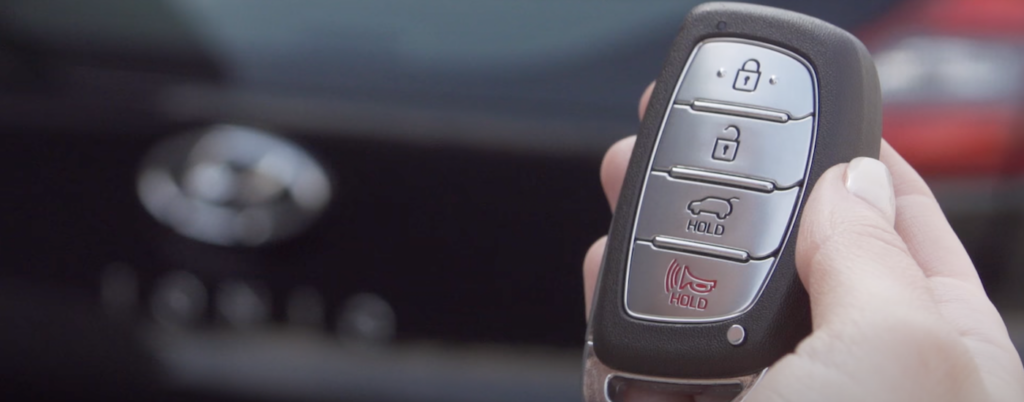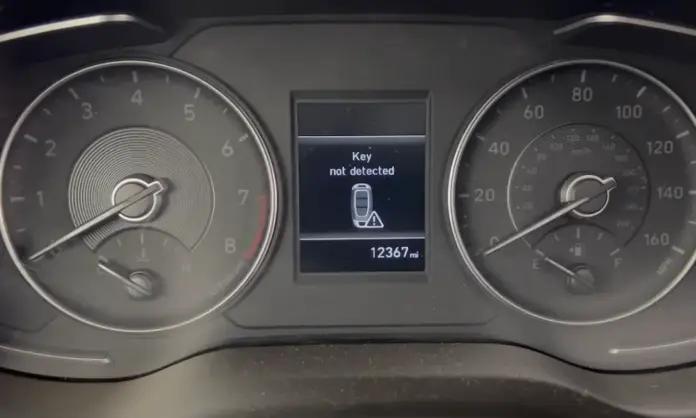Facing a “Key Not Detected” error in your Hyundai can be annoying, but it’s a common issue. Usually, this happens because the battery in the smart key fob is dead, which is easy to fix with a quick replacement. Keep reading for straightforward troubleshooting tips and solutions to help you reconnect your key fob to your car, so you can hit the road again without hassle.
Hyundai Smart Key Fob: How It Works
The Hyundai Smart Key Fob is a convenient tool that enhances your driving experience by offering keyless entry and ignition. It works in tandem with your car’s immobilizer system to ensure optimal security.
Key Components of the Smart Key Fob
The Smart Key Fob may look compact, but it’s packed with technology. Inside, it houses a radio transmitter that communicates with your car, enabling features like locking, unlocking, and push-button start. Additionally, it has buttons for functions such as trunk release and activating the alarm.
A small battery powers the fob. If it malfunctions, replacing this battery is often a straightforward fix. The fob’s casing is designed to snap apart easily, allowing you to access the battery for replacement. Refer to your owner’s manual for specific instructions.
The Role of the Immobilizer System
The immobilizer system is a security feature that prevents unauthorized access to your vehicle. It relies on a unique code shared between the fob and your car’s computer. When the code matches, the car starts; otherwise, it remains immobilized.
If the immobilizer system malfunctions or the code isn’t recognized, you may experience issues starting your vehicle. This could indicate a problem with the key fob, the immobilizer system, or the connection between the two. Professional diagnostics may be needed to resolve such issues.
Why Your Hyundai Might Display “Key Not Detected”

The “Key Not Detected” message can stem from several issues, including a depleted battery, signal interference, or faults in the key fob or car’s receiver system. Understanding these causes can help you identify and fix the problem efficiently.
Dead Key Fob Battery
The most common reason for this error is a dead or low battery in the key fob. When the battery loses power, it can’t communicate with your vehicle effectively.
Replacing the battery is simple. Carefully open the fob using a small tool, such as a flathead screwdriver, and remove the old battery. Insert a new one, typically a CR2032, ensuring the positive side faces up. Reassemble the fob and test its functionality.
Signal Interference
Electronic devices or environmental factors can disrupt the signal between your key fob and your vehicle. Items like mobile phones, metal objects, or even nearby electronics can cause interference, leading to detection issues.
To resolve this, try moving the fob closer to the car or away from potential sources of interference. If you’re in a high-interference area, such as a parking garage or near heavy electronics, this step can help restore functionality.
Key Fob Damage or Wear
Over time, key fobs can experience wear and tear, or they may become damaged if dropped or exposed to water. Internal components can loosen or corrode, preventing the fob from working correctly.
Inspect your key fob for visible signs of damage or dirt. Cleaning it gently might restore its functionality. If the issue persists, contact a Hyundai dealer for repair or replacement options.
Issues With the Car’s Receiver
The car’s receiver is responsible for detecting signals from the key fob. If the receiver malfunctions, it might fail to recognize even a fully functional fob.
Diagnosing receiver issues often requires professional tools. A Hyundai dealership or qualified mechanic can use advanced diagnostics to identify and repair the problem.
How to Troubleshoot and Fix “Key Not Detected” Errors
If your Hyundai key fob isn’t being detected, several steps can help restore its functionality. These include replacing the battery, resetting the fob, or using a manual override to start your car.
Replacing the Battery
A dead battery is often the root cause of detection errors. To replace it, open the key fob and remove the old battery. Insert a new one, ensuring the polarity is correct. Reassemble the fob and test its performance.
Resetting the Key Fob
Sometimes, resetting the key fob can resolve detection issues. To reset, enter your car and close all doors. Insert the key into the ignition and turn it to the “On” position. Hold the lock and unlock buttons on the fob for about 10 seconds. Turn the ignition off and remove the key. Test the fob to see if it works.
Bypassing the Error
If the error persists, try manually bypassing it. Press the key fob against the start button and attempt to start the car. This method leverages the fob’s proximity sensor to establish a direct connection.
Tips for Preventing Key Fob Issues
Proper care and maintenance of your Hyundai key fob can prevent common problems and extend its lifespan.
Protecting Your Key Fob
Keep your key fob in a protective case to avoid damage from drops or impacts. Protect it from water and extreme temperatures, as moisture and heat can harm internal components. Store it away from electronic devices to reduce signal interference.
Regular Maintenance
Regularly test your key fob to ensure it functions properly. Replace the battery every 1-2 years or as needed. Clean the buttons and exterior to remove debris that could affect performance. If problems arise, address them promptly to prevent further damage.

